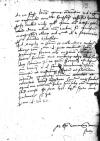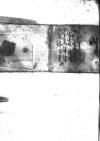Accepi cf. Ioannes DANTISCUS to Mauritius FERBER Löbau (Lubawa), 1534-03-23, CIDTC IDL 7003, letter lost⌊litterascf. Ioannes DANTISCUS to Mauritius FERBER Löbau (Lubawa), 1534-03-23, CIDTC IDL 7003, letter lost⌋ Reverendissimae Dominationis Vestrae, Löbau (Lubawa, Lubavia), town in northern Poland, Kulm Land (Ziemia Chełmińska), ca. 67 km E of Graudenz (Grudziądz), the main seat of the bishops of Kulm (Chełmno)⌊LoboviaeLöbau (Lubawa, Lubavia), town in northern Poland, Kulm Land (Ziemia Chełmińska), ca. 67 km E of Graudenz (Grudziądz), the main seat of the bishops of Kulm (Chełmno)⌋ 1534-03-23⌊23 Martii1534-03-23⌋ datas, quibus ipsius turbatum ex eo, quod nonnihil in conventibus nostris pro libertate et privilegiorum conservatione paper damaged⌈[e]e paper damaged⌉ liberius quam ceteri protulisset, animum cognovimus, erga coram Sigismund I Jagiellon (Zygmunt I) (*1467 – †1548), King of Poland and Grand Duke of Lithuania (1506-1548); Duke of Głogów (Glogau) (1499-1506), Duke of Opava (1501-1506), Governor of Silesia (1504-1506); son of King Kazimierz IV Jagiellon and Elisabeth of Austria⌊maiestate regiaSigismund I Jagiellon (Zygmunt I) (*1467 – †1548), King of Poland and Grand Duke of Lithuania (1506-1548); Duke of Głogów (Glogau) (1499-1506), Duke of Opava (1501-1506), Governor of Silesia (1504-1506); son of King Kazimierz IV Jagiellon and Elisabeth of Austria⌋ delatum esse. Cum tamen non solum Vestram Reverendissimam Dominationem Vestram, sed et me nonnullosque alios ita designatos esse a domino Achatius von Zehmen (Achacy Cema) (*ca. 1485 – †1565), 1517-1531 Chamberlain of Pomerania, 1531-1546 Castellan of Gdańsk (Danzig), 1545-1546 Voivode of Kulm (Chełmno), 1546-1565 Voivode of Marienburg (Malbork) (SBPN 1, p. 194-195; ORACKI 1984, p. 38-39; Urzędnicy 5/2, p. 198; PSB 4, p. 325-326)⌊Gdanensi castellanoAchatius von Zehmen (Achacy Cema) (*ca. 1485 – †1565), 1517-1531 Chamberlain of Pomerania, 1531-1546 Castellan of Gdańsk (Danzig), 1545-1546 Voivode of Kulm (Chełmno), 1546-1565 Voivode of Marienburg (Malbork) (SBPN 1, p. 194-195; ORACKI 1984, p. 38-39; Urzędnicy 5/2, p. 198; PSB 4, p. 325-326)⌋ accepi, quod quidem parvi et flocci feci, eo quod ipsa veritas mentiri non posset solaturque me illibata nostra conscientia. Sed non possumus non mirari, quod prudentissimus Sigismund I Jagiellon (Zygmunt I) (*1467 – †1548), King of Poland and Grand Duke of Lithuania (1506-1548); Duke of Głogów (Glogau) (1499-1506), Duke of Opava (1501-1506), Governor of Silesia (1504-1506); son of King Kazimierz IV Jagiellon and Elisabeth of Austria⌊rexSigismund I Jagiellon (Zygmunt I) (*1467 – †1548), King of Poland and Grand Duke of Lithuania (1506-1548); Duke of Głogów (Glogau) (1499-1506), Duke of Opava (1501-1506), Governor of Silesia (1504-1506); son of King Kazimierz IV Jagiellon and Elisabeth of Austria⌋ huiusmodi delationibus faciles praebuerit aures. Magnum mirum et inauditum apud me est potissime, non audita excusamine innoxia, stabiliverit aliquantulum in animum mendacii suggestionem. Ut a(u)t(em) de his Vestra Reverendissima Dominatio sibi nihil metuat, quoniam a veritate aliena sint, consulo. Nam maiora coram ipsa Sigismund I Jagiellon (Zygmunt I) (*1467 – †1548), King of Poland and Grand Duke of Lithuania (1506-1548); Duke of Głogów (Glogau) (1499-1506), Duke of Opava (1501-1506), Governor of Silesia (1504-1506); son of King Kazimierz IV Jagiellon and Elisabeth of Austria⌊maiestate regiaSigismund I Jagiellon (Zygmunt I) (*1467 – †1548), King of Poland and Grand Duke of Lithuania (1506-1548); Duke of Głogów (Glogau) (1499-1506), Duke of Opava (1501-1506), Governor of Silesia (1504-1506); son of King Kazimierz IV Jagiellon and Elisabeth of Austria⌋ et consessu senatus sui pro libertate et privilegiorum defensione locutus sum, et non traxit hoc maiestas sua in malam partem seu quidpiam meae temeritati impinxerit, sed libenter audivit et probavit.
 AAWO, AB, D. 8, f. 72v
AAWO, AB, D. 8, f. 72v
Fecit etiam nunc Sigismund I Jagiellon (Zygmunt I) (*1467 – †1548), King of Poland and Grand Duke of Lithuania (1506-1548); Duke of Głogów (Glogau) (1499-1506), Duke of Opava (1501-1506), Governor of Silesia (1504-1506); son of King Kazimierz IV Jagiellon and Elisabeth of Austria⌊sua maiestasSigismund I Jagiellon (Zygmunt I) (*1467 – †1548), King of Poland and Grand Duke of Lithuania (1506-1548); Duke of Głogów (Glogau) (1499-1506), Duke of Opava (1501-1506), Governor of Silesia (1504-1506); son of King Kazimierz IV Jagiellon and Elisabeth of Austria⌋ suis litteris in quodam negotio mihi mentionem de Reverendissima Dominatione Vestra. Si habuisset offensum in Reverendissimam Dominationem Vestram animum, profecto hoc non fecisset. Quod ob hos susurrones Vestra Reverendissima <Dominatio> suam pro libertate suam statuerit deponere defensio hidden by binding⌈[io]io hidden by binding⌉nem, vel saltem moderare, fixa spe fretus ipsam hoc non facturam autumo, nam huiusmodi defensiones cum acrimonia et non pavide, nec meticulose re et opere proferri hidden by binding⌈[i]i hidden by binding⌉ volunt. Quae omnia extensius cum Vestra Reverendissima Dominatione commentandum in proximum Provincial Diet of Royal Prussia ⌊conventumProvincial Diet of Royal Prussia ⌋ reiicio in Marienburg (Malbork), town and castle in northern Poland, Pomeranian Voivodeship, on the Nogat river, a branch of the Vistula at its delta, the capital of the Grand Masters of the Teutonic Order in Prussia (1309-1457), a voivodeship capital in Royal Prussia, which belonged to the Kingdom of Poland (1466-1772). Marienburg (taking turns with Graudenz (Grudziądz)) was the venue for the Provincial Diets of Royal Prussia, which were chaired by the bishop of Ermland (Warmia)⌊MargenburgoMarienburg (Malbork), town and castle in northern Poland, Pomeranian Voivodeship, on the Nogat river, a branch of the Vistula at its delta, the capital of the Grand Masters of the Teutonic Order in Prussia (1309-1457), a voivodeship capital in Royal Prussia, which belonged to the Kingdom of Poland (1466-1772). Marienburg (taking turns with Graudenz (Grudziądz)) was the venue for the Provincial Diets of Royal Prussia, which were chaired by the bishop of Ermland (Warmia)⌋, si saltem propter Stanisław Kostka (*1487 – †1555), as a leader of the so-called nobles' party active in Royal Prussia since 1536, Kostka stood in opposition to most of the members of the Council of Royal Prussia, who wanted to maintain the autonomy of the province and a "balance of power" in terms of governance. The tension between the Prussian Subtreasurer and the Council had been increasing since the Diet in Graudenz (Grudziądz) in 1533. Kostka, connected with the royal court since his youth, was sent to Graudenz as the King's deputy and, contrary to custom, decided to take part in the proceedings. In response to such a step, the Council members stopped the meeting. Kostka accused them of hostility towards the Poles and intervened on this matter at the court. In the absence of the then Bishop of Ermland (Mauritius Ferber) it was Dantiscus who chaired the Graudenz Diet. The incident badly harmed his future relationships with Kostka; 1531-1555 Treasurer of the Prussian lands and Treasurer of Marienburg (Malbork); 1544-1545 Castellan of Elbing (Elbląg), 1545-1546 Castellan of Kulm (Chełmno); 1546-1549 Vice-Voivode of Kulm; 1546-1551 Voivode of Pomerania; 1551-1555 Voivode of Kulm (PSB 14, p. 356; Urzędnicy 5/2, p. 216; MAŁŁEK 1976, p. 119-123)⌊KostkamStanisław Kostka (*1487 – †1555), as a leader of the so-called nobles' party active in Royal Prussia since 1536, Kostka stood in opposition to most of the members of the Council of Royal Prussia, who wanted to maintain the autonomy of the province and a "balance of power" in terms of governance. The tension between the Prussian Subtreasurer and the Council had been increasing since the Diet in Graudenz (Grudziądz) in 1533. Kostka, connected with the royal court since his youth, was sent to Graudenz as the King's deputy and, contrary to custom, decided to take part in the proceedings. In response to such a step, the Council members stopped the meeting. Kostka accused them of hostility towards the Poles and intervened on this matter at the court. In the absence of the then Bishop of Ermland (Mauritius Ferber) it was Dantiscus who chaired the Graudenz Diet. The incident badly harmed his future relationships with Kostka; 1531-1555 Treasurer of the Prussian lands and Treasurer of Marienburg (Malbork); 1544-1545 Castellan of Elbing (Elbląg), 1545-1546 Castellan of Kulm (Chełmno); 1546-1549 Vice-Voivode of Kulm; 1546-1551 Voivode of Pomerania; 1551-1555 Voivode of Kulm (PSB 14, p. 356; Urzędnicy 5/2, p. 216; MAŁŁEK 1976, p. 119-123)⌋ illum locum odio non habuerit, vel Elbing (Elbląg), city in northern Poland, Pomerania, on the Vistula Lagoon, one of the three Great Prussian Cities (beside Gdańsk (Danzig) and Thorn (Toruń)) which had representatives in the Prussian Council; member of the Hanseatic League⌊ElbingoElbing (Elbląg), city in northern Poland, Pomerania, on the Vistula Lagoon, one of the three Great Prussian Cities (beside Gdańsk (Danzig) and Thorn (Toruń)) which had representatives in the Prussian Council; member of the Hanseatic League⌋. Nam ut omnes et singuli conveniamus, necessitas expostulat hidden by binding⌈[t]t hidden by binding⌉, meo quidem iudicio et etiam magna. Haec latius cum domino Achatius von Zehmen (Achacy Cema) (*ca. 1485 – †1565), 1517-1531 Chamberlain of Pomerania, 1531-1546 Castellan of Gdańsk (Danzig), 1545-1546 Voivode of Kulm (Chełmno), 1546-1565 Voivode of Marienburg (Malbork) (SBPN 1, p. 194-195; ORACKI 1984, p. 38-39; Urzędnicy 5/2, p. 198; PSB 4, p. 325-326)⌊CzemaAchatius von Zehmen (Achacy Cema) (*ca. 1485 – †1565), 1517-1531 Chamberlain of Pomerania, 1531-1546 Castellan of Gdańsk (Danzig), 1545-1546 Voivode of Kulm (Chełmno), 1546-1565 Voivode of Marienburg (Malbork) (SBPN 1, p. 194-195; ORACKI 1984, p. 38-39; Urzędnicy 5/2, p. 198; PSB 4, p. 325-326)⌋, qui se Vestram Reverendissimam Dominationem visurum aiebat, contuli. Perplexam dominus Mikołaj Działyński (Nikolaus von Dzialin) (†1545), from 1507 royal courtier; 1510-1528 Chamberlain of Dobrzyń; 1528-1544 Castellan of Kulm (Chełmno); 1544-1545 Voivode of Pomerania; Starosta of Bratian, Strasburg in Preussen (Brodnica), and Dobrzyń (PSB 6, p. 92-94; Urzędnicy 5/2, p. 204)⌊castellanus CulmensisMikołaj Działyński (Nikolaus von Dzialin) (†1545), from 1507 royal courtier; 1510-1528 Chamberlain of Dobrzyń; 1528-1544 Castellan of Kulm (Chełmno); 1544-1545 Voivode of Pomerania; Starosta of Bratian, Strasburg in Preussen (Brodnica), and Dobrzyń (PSB 6, p. 92-94; Urzędnicy 5/2, p. 204)⌋ habet causam, quam damnari, prout coram referemus, tutius, ex quo iam pridem ventilata est. Queritur etiam adversus Reverendissimam Dominationem Vestram, quod ipsa in proximo Provincial Diet of Royal Prussia ⌊conventuProvincial Diet of Royal Prussia ⌋ bis interrupuisset votum eius; malle se potius abesse, quam in libero consilio non liberum proferre votum posse dixit. H(oc) or H(aec)⌈H(oc)H(oc) or H(aec)⌉ in aurem secretam et coram uberius.
 AAWO, AB, D. 8, f. 73r
AAWO, AB, D. 8, f. 73r
De et super litteris, quas coniunctim ad Sigismund I Jagiellon (Zygmunt I) (*1467 – †1548), King of Poland and Grand Duke of Lithuania (1506-1548); Duke of Głogów (Glogau) (1499-1506), Duke of Opava (1501-1506), Governor of Silesia (1504-1506); son of King Kazimierz IV Jagiellon and Elisabeth of Austria⌊regiamSigismund I Jagiellon (Zygmunt I) (*1467 – †1548), King of Poland and Grand Duke of Lithuania (1506-1548); Duke of Głogów (Glogau) (1499-1506), Duke of Opava (1501-1506), Governor of Silesia (1504-1506); son of King Kazimierz IV Jagiellon and Elisabeth of Austria⌋ et Bona Sforza (*1494 – †1557), Queen of Poland and Grand Duchess of Lithuania (1518-1557); the second wife of Sigismund I Jagiellon; Duchess of Bari and Rossano; daughter of Gian Galeazzo Sforza of Milan and Isabella of Aragon⌊reginalem maiestatesBona Sforza (*1494 – †1557), Queen of Poland and Grand Duchess of Lithuania (1518-1557); the second wife of Sigismund I Jagiellon; Duchess of Bari and Rossano; daughter of Gian Galeazzo Sforza of Milan and Isabella of Aragon⌋ scripsimus, responsum hactenus prorsus nullum vidi, quod quia non accepi, extruetiamdere etiam non valui; si quidpiam accepissem, illico ad Reverendissimam Dominationem Vestram partiario proprio nuntio volasset.
Quod Henry VIII Tudor (*1491 – †1547), 1509-1547 King of England; son of Henry VII Tudor and Elizabeth of York⌊AnglusHenry VIII Tudor (*1491 – †1547), 1509-1547 King of England; son of Henry VII Tudor and Elizabeth of York⌋ in Clement VII (Giulio de' Medici) (*1478 – †1534), 1523-1534 Pope⌊papamClement VII (Giulio de' Medici) (*1478 – †1534), 1523-1534 Pope⌋ et ecclesiasticos molitur, ex paper damaged⌈[ex]ex paper damaged⌉ aliorum Vestra Reverendissima Dominatio puto audivit litteris. Principes ferme omnes in perniciem ecclesiastici status furiunt aut mutuis odiis contabescunt.
Deus saniora praebere, quam sperandum est, dignetur. Cui Vestram Reverenisimam Dominationem sanam, incolumem, felicem, iucundam et undecumque prosperam et florentem commendo.
Ignoscatque incultui characteri et celeritati litterarum congestioni. Cancellarium neque scribam apud me nunc non habeo, forensibus enim negotiis sunt onusti.




 AAWO, AB, D. 8, f. 73v
AAWO, AB, D. 8, f. 73v